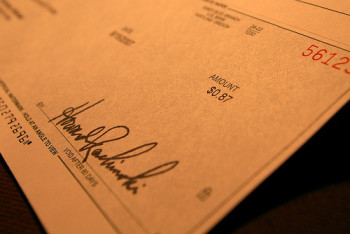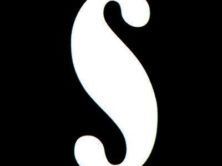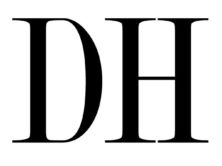
Checkbook journalism was one of the issues addressed. (Credit: michael kooiman via Flickr)
The U.S. Society of Professional Journalists has a new ethics code.
The revised code was approved Sept. 6 at the Excellence in Journalism Conference in Nashville this past weekend. The SPJ says on its website that it started revising the code last year. The earlier version had been in effect since 1996 and had been essentially a go-to guide for journalists across the world as an ethics guidelines.
Read the new code in full. The code calls for “original sources,” fact checking, context, updating with new information as available, and contacting “subjects of news coverage” if they are criticized.
The new code was written with some debate among members and experts who questioned if the code, with its universal values, really needed an update. The counter argument prevailed that noted the last revision was written before the dominance of the Internet, citizen journalists and social media and thus required an update.
Regarding anonymity, the code recommends journalists “identify sources clearly” and “consider sources’ motives before promising anonymity.”
“Reserve anonymity for sources who may face danger, retribution or other harm, and have information that cannot be obtained elsewhere. Explain why anonymity was granted,” the code dictates.
The code goes on to tell journalists to “serve as watchdogs,” include diversity, and “support and open and civil exchange of views.” Content should be attributed and labeled as illustration, advocacy or commentary.
The code reminds journalists that just because they have something they don’t need to publish it if it’s not ethical. “Balance the public’s need for information against potential harm or discomfort,” the code states.
The code goes on, “Recognize that legal access to information differs from an ethical justification to publish or broadcast.” Further, private people should have “a greater right to control information about themselves.”
As before, journalists are instructed to “avoid conflicts of interest, real or perceived,” and when they can’t avoid the conflicts they should make a full disclosure to the readers.
Journalists are tasked with several instructions in the section on “be accountable and transparent.” The code says:
“Journalists should
“– Explain ethical choices and processes to audiences. Encourage a civil dialogue with the public about journalistic practices, coverage and news content,”
“– Respond quickly to questions about accuracy, clarity and fairness.
“– Acknowledge mistakes and correct them promptly and prominently. Explain corrections and clarifications carefully and clearly.
“– Expose unethical conduct in journalism, including within their organizations.
“– Abide by the same high standards they expect of others”
Dave Cuillier, whose term as president for SPJ just ended, told iMediaEthics by phone “it was phenomenal we were able to accomplish this this year.” He added that there was “a lot of time, a lot of great minds at work, a lot of input…comments and suggestions from people,” that went into the revision.
Noting the code is “not perfect,” he said the new code is “definitely more relevant to today’s media environment.”
Moving forward, “it’s not like we need wholesale changes every year,” Cuillier said, “ethics is ethics from Aristotle to today.”
The SPJ’s ethics committee will also continue to release position paperson various ethical issues.
“There is no set schedule for releasing position papers, but we hope to begin fleshing out many portions of the code as soon as possible,” the new ethics chair, Andrew Seaman, told iMediaEthics by e-mail.
“Fortunately, the Society has a large collection of position papers and case studies already online. Once a system is in place to link from the Code of Ethics, we’ll start connecting portions to existing documents. Also, we’ll be relying on members of the Society and working journalists to contribute perspective pieces and opinion so that we can offer a range of opinions. The specifics are still being ironed out.”
He added that if anyone has any suggestions for topics of the position papers or code they can contact him.
Code not enforceable
For international readers unfamiliar with the Society of Professional Journalists, the SPJ notes on its website that its code is only guidance, “voluntary,” and isn’t enforceable. “It is not a set of rules, rather a guide that encourages all who engage in journalism to take responsibility for the information they provide, regardless of medium,” the SPJ says. “The code should be read as a whole; individual principles should not be taken out of context. It is not, nor can it be under the First Amendment, legally enforceable.”
Further, SPJ notes it can’t handle complaints or even control SPJ members and expects other journalists to keep ethics in line:
“We do not have a mechanism for investigating complaints or enforcing discipline on SPJ members, much less other journalists. But our code does provide a framework to evaluate ethical behavior, and we encourage fellow journalists and the public to hold news reports and commentary up to ethical scrutiny. Ultimately, that is the most effective antidote to questionable reporting, not quasi-judicial proceedings.”
SPJ says on its website it doesn’t police ethics because it’s afraid doing so would damage free speech. The SPJ website states:
“The majority has felt that establishing a quasi-judicial system, such as those found in some other professions, would inevitably lead to actions by governments, courts or their proxies that would restrict the rights to free speech and free press guaranteed by the First Amendment to the U.S. Constitution.”
Responses to the Updated Code
Steve Buttry, a Lamar Visiting Scholar with LSU’s Manship School of Mass Communications, reviewed the new code and concluded it’s “an improvement but a disappointment.” In his Sept. 8 blogpost, Buttry, who disclosed that he very recently signed up for SPJ, called for “better leadership.”
“SPJ is following, not leading, in updating journalism ethics,” Buttry wrote. “It did not even catch up to the daily practice of journalism, let alone start leading.”
Noting that he had criticized earlier versions of the code, Buttry said he was glad that the approved version included transparency as a “core value” and called for journalists to “take responsibility for the accuracy of their work.” He also said it was good for the SPJ to promise to include links to essays abut specific ethical issues in the online version of the code.
On the other hand, he suggested the SPJ should have had stronger guidance about owning up to errors, reporting on “he-said-she-said stories,” and accuracy checklists, social media, linking standards ad opinions in journalism. “By refusing to address issues that journalists face today, the committee deliberately made it less relevant the day they passed it,” Buttry argued. “It’s not going to grow more relevant as journalism continues to change. So I guess it will stand the test of time by being similarly inadequate now and in future years.”
In response, SPJ president Dave Cuillier, whose term just ended, told Buttry he thinks SPJ “should be looking at the code continuously.”
Michael Koretzky, a national board member for SPJ and SPJ Region 3 director, criticized the code and the way SPJ handled the updating of the code in a blogpost on SPJ Region 3’s website. Koretzky has previously criticized the process for being “less-than-transparent” in the Region 3 blog.
Poynter’s Al Tompkins added that Radio and Television Digital News Association also is working on updating its ethics code and presented a proposal for a new code.
UPDATE: 9/9/2014 3:06 PM EST Added comments from Cuillier and Seaman






